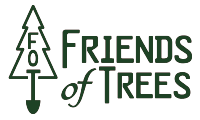Four questions to ask before choosing a fruit tree

Friends of Trees and the Portland Fruit Tree Project have a wonderful symbiosis. Friends of Trees helps people with planting, establishment and early maintenance of trees. Portland Fruit Tree Project helps people harvest, prune and otherwise care for fruit trees once established. We talked with Bob Hatton, Program Coordinator at the Portland Fruit Tree Project, about some important questions to ask before choosing a fruit tree.
How much light do I have?
“Solar access is really important,” Hatton says. To ensure a good harvest, choose a spot that can provide 6-8+ hours of sunlight during the growing season.
How much space do I have?
With no pruning, standard-sized fruit trees can get huge—and difficult to care for and harvest. Many fruits come in a dwarf root stock (8-10 feet tall and wide if unpruned) or semi-dwarf (12-15 feet) that work well for urban streets and yards.
“We really try and recommend that folks plant trees that are going to be a manageable size for them,” Hatton says.
When do I want to harvest?
If timing is important to you, check when your fruit variety will need to be harvested. Plums and many other fruits grow in the summer. You can harvest persimmons through the end of November. Apples can be harvested from June through the fall, depending on the variety. You can even plant trees with different harvest times to extend the productivity of your home orchard.
Does the fruit tree need a mate?
To bear fruit, a tree may need to cross-pollinate with another tree of its kind. But if you live in town, don’t worry about it too much, Hatton says. Most fruit trees can cross-pollinate with similar varieties nearby in someone else’s yard (honey bees can travel for miles). Exceptions include paw paws or kiwis—you should grow two in your yard to bear fruit. And if you’re not sure about your particular fruit variety, ask an expert.
“People all over the world have been growing their own fruit for a long time,” Hatton says. “It’s just about empowering yourself with the knowledge and skills to care for the tree correctly.”
Ready to find your perfect fruit tree match? Check out this post for some tips.
